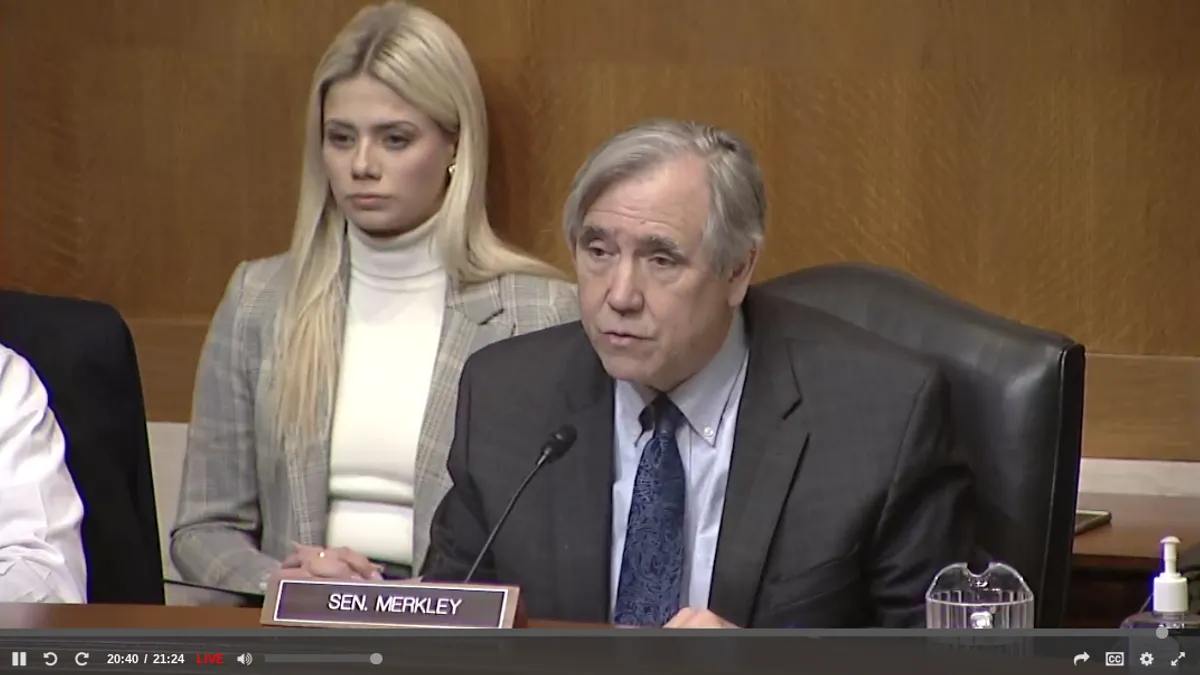The impact of plastics in the environment took center stage at a Senate subcommittee hearing Thursday where lawmakers clashed over the future of plastics production and recycling.
A panel of scientists testified during a Senate meeting of the Subcommittee on Chemical Safety, Waste Management, Environmental Justice, and Regulatory Oversight. It was the first in a series of six meetings Sen. Jeff Merkley, D- Oregon, said are necessary to get lawmakers on the same page about how to handle urgent plastic pollution issues affecting air, water and human health.
“The fossil fuel industry is envisioning a massive increase in the production of plastics, but that will only amplify the problems,” Merkley said. By the end of the hearings series, Merkley said, the committee hopes to have “strategies that we can take to a national level.”
The first hearing on Thursday underscored wider national tensions over how to invest in, or regulate, plastics production and recycling. The plastics industry and its supporters in Congress see emerging technologies, including chemical recycling, as a key to creating jobs while keeping hard-to-recycle plastics out of disposal sites. Yet environmental scientists at the hearing said the planet already has too much plastic and recommended investing in cleanup efforts, better recycling systems and methods that limit further plastic production.
During the hearing, Sen. Markwayne Mullin, R-Okla., called for further investments in chemical recycling. He touted Oklahoma’s recent adoption of a law reclassifying chemical recycling as a manufacturing process instead of waste management. Similar laws backed by the American Chemistry Council have passed in more than 20 other states.
“Innovation, not over-regulation, is where we need to focus in,” Mullin said, criticizing environmental groups’ calls to ban or significantly restrict chemical recycling permitting. “If our goal is to recycle more material then the committee should focus on supporting technologies and innovations that do just that instead of trying to ban them.”
Merkley was the co-sponsor of the Break Free From Plastic Pollution Act, legislation that includes calls for a temporary freeze on permitting for new plastics production facilities so the federal government can investigate their health and environmental impacts. The bill did not pass before the end of the legislative session, but is expected to be reintroduced.
Chelsea Rochman, a professor at the University of Toronto St. George who studies microplastics, told lawmakers that reducing overall production, particularly of single-use plastics, would help keep more plastics from entering the environment. Rochman called for more resources to aid environmental cleanup efforts and boost recycling infrastructure as other litter mitigation efforts.
Rochman also called for strategies to bring up the country’s “incredibly low” recycling rate, particularly by incentivizing producers to use more postconsumer recycled plastic in products. “It’s currently more expensive to buy postconsumer recycled content than it is to buy virgin plastic,” but Rochman argues that laws mandating levels of PCR in products would help.
Participants in the discussion agreed that plastics pollution does not belong in the environment, but some disagreed about the degree to which such pollution is harming air, water and human health.
Arvind Ravikumar, a research associate professor at the University of Texas at Austin, said current methods for estimating greenhouse gas emissions for the oil and gas industry could be off by as much as 60%. This means data is likely also inaccurate for emissions intensity estimates for plastics production. More research is needed to get a better understanding of the numbers, he said during the hearing.
Ravikumar recommended “rapidly reducing methane emissions across the supply chain” through regulations, efforts to decarbonize energy grids and through better monitoring systems at locations thought to emit significant amounts of greenhouse gases. He highlighted satellites and drone technologies, also used by the waste industry, as an emerging monitoring solution.
Yet Mullin pointed to a study from McKinsey that indicates the production of some plastic products emit less greenhouse gas compared with their non-plastic alternatives. An example is PET soft drink containers, which the study says emit about half the greenhouse gasses of aluminum bottles.
In an emailed statement prior to the hearing, PLASTICS also highlighted the McKinsey study, adding that the plastics industry “is committed to solutions in sustainability that keep plastics in our economy and out of our environment.”
The date for the next hearing in the series has not yet been announced.
Interested in more packaging news? Sign up for Packaging Dive today.























